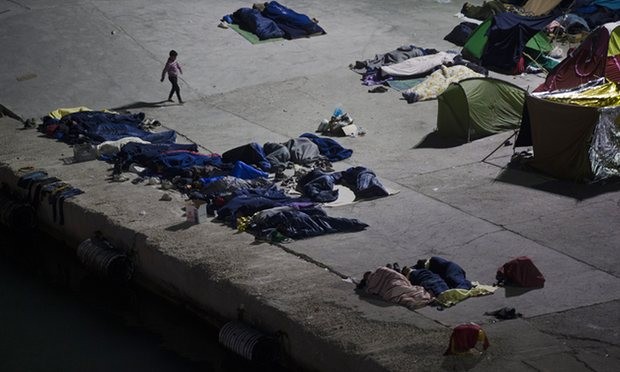Refugees in Greece threaten suicide if forced to go back to Turkey
Afghans and Syrians on Chios say policy will lead to ‘terrible scenes’, as concerns grow over 13 deported ‘by mistake’

Afghans and Syrians detained in a camp on the Greek island of Chios say they will kill themselves if they are expelled from the EU under its migration deal withTurkey.
On Monday, 202 migrants were forcibly returned from Lesbos and Chios to the Turkish coast under the landmark deal aimed at halting “irregular” migration to Europe.
But Souaob Nouri from Kabul, who is held in the high-security camp in Chios, said: “If they deport us, we will kill ourselves. We will not go back.”
A man next to him warned of “terrible scenes” if Greek authorities insisted on pursuing policies that have already caused alarm among human rights groups.
“We are not terrorists,” said the man, who gave his name as Akimi. “We are refugees. The conditions here are very bad. There is no water. They hit pregnant women. Why do they treat us like this? All we want is asylum.”
The expulsions have been fraught with controversy. Thirteen of the 66 deportees who were sent back across the Aegean Sea from Chios under armed guard are believed to have “expressed intent” to apply for asylum – enough, say UN officials, to keep them in Greece until their requests were examined.
“Between 20 March when the deal came into effect and 1 April when it was voted into legislation [by Greek MPs] we have seen limits in the ability of authorities to process claims,” said Katerina Kitidi with the UN refugee agency on Chios, an east Aegean island south of Lesbos. “There has been a definite lack of clarity.”
The uncertainty has quickly fuelled tensions on the island.
More than 800 inmates broke out of the vastly overcrowded detention facility last week in violent scenes that ultimately saw men, women and children march into Chios town.
Ever since, they have occupied the concrete quayside that doubles as the island’s docking area for ferries offering routes to the mainland. The disruption of services – although they were partially reinstated on Wednesday – has tested locals’ forbearance.
Mindful of their own past as refugees from the heartlands of Anatolia around the time of the 1919-22 Greco-Turkish war, locals have been welcoming émigrés with open arms. But the sympathy that once greeted the influx – some 125,000 Europe-bound migrants and refugees landed on the island’s beaches last year – has now begun to wane. Against a backdrop of continuing boat arrivals from Turkey it appears set to evaporate further.
In the town hall, Chios’s mayor, Manolis Vournous, expressed nervousness that the island had reached an explosive point. Implementation of the EU-Turkey deal, without the proper infrastructure and personnel, was tantamount to turning “a chair into a table”, he said. Locals, stung by six years of biting austerity, are running out of patience.
“That’s the most scary thing,” said Vournous, an architect by profession. “People see their lives being stopped. For so long they have been positive and supportive but now I am afraid it will change. We have to persuade them [refugees] to leave the port and we have to avoid locals losing patience.”
Indicative of the mood was Dimitris Dimopoulos, the owner of the Mihanogorgeion cafe opposite the port. The sight of the dockside being turned into a tent city has not only infuriated him, but affected business.
“It’s as if these people have more rights than we do,” he said. “Every day I spend hours cleaning up their mess. You should see the toilets here. It’s atrocious. The state is to blame. Soon we will be taking things into our own hands.”
The first signs of that happening took place late on Wednesday when hundreds of protesters, led by supporters of the neo-fascist Golden Dawn party attempted to storm the town hall. Molotov cocktails and rocks were later thrown at a cafe near the port frequented by leftwing migrant solidarity groups.
Across the Aegean in Turkey, aid workers and journalists were denied access to the 13 asylum seekers allegedly deported from Chios by mistake on the first day of the EU-Turkey deal, raising concerns that they could be expelled from Turkey without legal recourse.
The UN says the 13 were not given the chance to apply for asylum before their deportation to Turkey on Monday – undermining EU claims that all asylum seekers would be given the chance to claim asylum in Greece.
The 13 are being held in a remote detention centre in Pehlivanköy, north-western Turkey, built in recent weeks with EU money – and now await deportation from Turkey to their home countries.
On Wednesday, Ankara refused to allow the UN high commissioner for refugees access to the asylum seekers, and also turned down a request from the Guardian to interview them. A police officer guarding the facility told the Guardian that those inside could be deported “within two weeks – or two days”.
It was unclear when Greece would send more people to join them. Deportations were suspended on Monday, but Turkish officials said they expected more people to arrive on Friday. Marine Traffic, an online maritime monitoring site, showed that one of the boats used for deportation was ready and waiting in the main harbour in Lesbos.
How to submit an Op-Ed: Libyan Express accepts opinion articles on a wide range of topics. Submissions may be sent to oped@libyanexpress.com. Please include ‘Op-Ed’ in the subject line.
- CBL devalues dinar by 13.3% against foreign currencies - April 07, 2025
- Libyan teen wins bronze for natural antibiotic discovery - April 07, 2025
- Tunisia begins major migrant camp clearance - April 05, 2025


